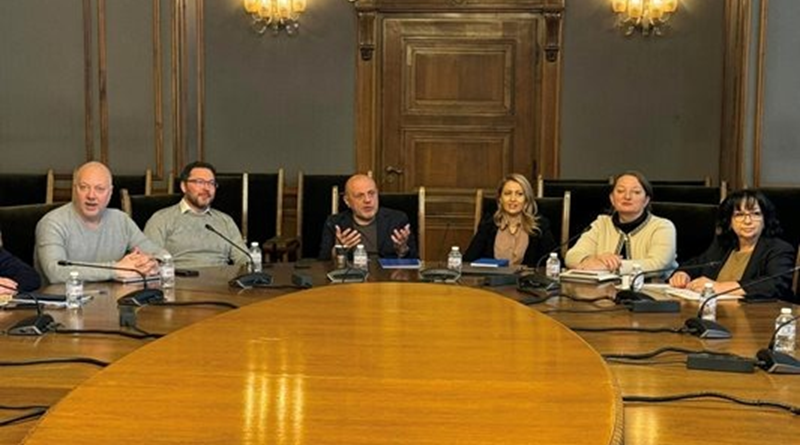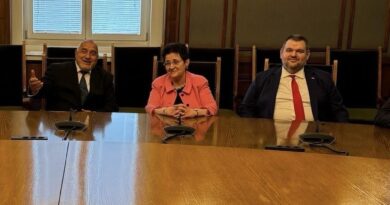GERB’s Negotiation Tactics: Old Tricks, New Consequences
GERB has once again deployed its signature tactic—delegating negotiations to Borisov’s “sherpas” while he, like a “god in the heavens,” dictates outcomes from above. Although the precise details of the discussions remain unclear, it’s evident that these intermediaries handled critical issues, including key topics like the prime minister and cabinet composition, which should have been addressed at a leader-level meeting.
The irony is unmistakable—a leader-level meeting should have been the starting point, establishing the philosophical framework for negotiations. The stark differences in the parties’ positions make this omission even more glaring. GERB is pushing for a political cabinet dominated by its own prominent figures and supported by other parties. Their goal is transparent: a full-scale comeback to erase the memory of the 2020 protests and solidify Borisov’s legacy before it fades into history, concluding this cycle of electoral victories without actual governance. However, this formula is fundamentally flawed.
Behind the nomination of Rosen Zhelyazkov as a potential prime minister, GERB has lined up other key ministers—equally “prominent” party figures—essentially forming a party-driven cabinet. This approach is a recipe for failure.
A Partisan Approach vs. an Equidistant Solution
While some parties seek a balanced and statesmanlike solution, GERB remains entrenched in its partisan approach. This strategy, however, conceals deeper concerns for Borisov—chief among them the “Peevski factor” and the fear that he may not be able to control the cabinet, particularly in areas related to limiting corruption and dismantling Peevski’s networks of influence.
The GERB leader seems uncertain whether he can avoid the “wrath of the corpulent one” if Peevski’s interests are directly challenged. Under this pressure, Borisov appears inclined to resort to a fallback plan—shifting the “hot potato” that is Peevski onto President Radev. This could involve blocking Sarafov’s appointment, triggering another caretaker government, appointing a new interior minister, or limiting Peevski’s ability to influence controlled or bought votes in the event of new elections.
Attempts to Rewrite Reality
GERB is clearly attempting to rewrite its legacy, distancing itself from the 2020 protests and its 15-year history of corruption and public disillusionment. Although protests have subsided, GERB’s support has not increased compared to 2020; if anything, it has eroded further.
Rather than confronting reality, GERB seeks to deflect attention with the narrative that “they’re not the only ones to blame,” focusing on fabricated media scandals targeting the opposition.
One example is the attacks on Kiril Petkov over his Canadian citizenship. The facts are clear: Petkov is no longer a Canadian citizen and has filed the necessary renunciation. Even if there were an administrative infraction, it lacks intent and amounts to a minor procedural issue. On both moral and societal impact scales, Petkov operates on a completely different level compared to Borisov and Peevski.
Support Independent Analysis
Help us keep delivering free, unbiased, and in-depth insights by supporting our work. Your donation ensures we stay independent, transparent, and accessible to all. Join us in preserving thoughtful analysis—donate today!
Meanwhile, GERB’s spokespeople attempt to equate Borisov and Peevski—two oligarchs deeply entrenched in corruption—with Petkov. This is absurd. If there were genuine grounds for charges against Petkov or other PPDB (Continue the Change and Democratic Bulgaria) leaders, Borisov and Peevski, who effectively control the prosecution, would have acted without hesitation. The absence of such action is telling.
The Heavy Burden of GERB’s Corruption
As I have previously argued, GERB needs a period of political purgatory—a transitional phase led by individuals untainted by corruption. This is the only viable path forward. Yet GERB appears unwilling to embrace such a course.
The problem extends beyond Rosen Zhelyazkov to the other figures expected to follow him, particularly in key ministries like finance, energy, and interior affairs. These appointments do little to inspire public confidence that GERB is ready to break away from its entrenched corruption practices. Instead, the party seems intent on rehabilitating a governance model that society has already deemed a failure.
The Dilemma for DB and BSP
Other negotiating parties, including DB, BSP, and ITN, have called for a technocratic cabinet with minimal partisan influence. DB, as a key player in forming a regular government, has taken a logical stance. Its supporters would find it impossible to accept participation in a government that sustains GERB’s corrupt model. The underlying principle is clear: personnel choices define the governance model.
To Sum Up
This is not the end but rather the beginning of the end. For now, Borisov has launched an “information bomb” and will decide his next steps after gauging the reactions of society and DB/PP. His primary goal is evident—to shift the blame for his political stagnation onto others.
The situation is reminiscent of the Denkov cabinet’s failed rotation—Borisov and PP/DB negotiate, but in the end, Peevski makes the final call.
Ilian Vassilev



